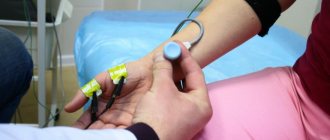Dizziness is a common reason (2nd most common after complaints of pain in the head area) for seeking professional medical help. If you feel dizzy when turning your head when the patient is in a lying position, this can be associated with many pathologies. To confirm the diagnosis of BPPV, known as benign paroxysmal vertigo, or another, the doctor will order an examination, the results of which will help determine the causes of the disorders.
What are you complaining about?
Finding the true cause of dizziness is not an easy task. After all, completely different conditions can be hidden behind the patient’s complaints, many of which are the result of stress and emotional disorders. As a rule, such dizziness, which experts call non-systemic, is accompanied by palpitations, chills, a feeling of intoxication, lightheadedness, lack of air, blurred vision, and occurs spontaneously in a stuffy room, in the subway, or in a crowd. There is nothing pleasant about this, of course. But such dizziness does not pose a particular risk to health and life.
The same cannot be said about true, systemic dizziness with a clearly defined illusion of movement (of the patient himself or surrounding objects), which manifests itself not only as constant, painful attacks. They are fraught with more serious problems. It is no secret that dizziness is a frequent companion to such serious diseases as Meniere's disease (a chronic non-inflammatory disease of the inner ear), neuroma (tumor of the auditory nerve), circulatory disorders in the auditory artery (in which not only vestibular function is affected, but also hearing), stroke. .
How to make a diagnosis?
The doctor, interviewing the patient regarding the factors that cause dizziness, will ask questions of the following nature:
- the symptoms and frequency of their occurrence chaotic or regular?
- what actions lead to dizziness;
- How long does dizziness last, what sensations occur during this?
- factors that could predispose to the appearance of dizziness (infections, injuries, hypertension, heart problems, diseases of the nervous system, stress, the results of a drug overdose, toxins, drugs, alcohol);
- the development of dizziness by a disease that was acquired by a person sexually cannot be ruled out
- possible consequences of dizziness (impaired coordination, slurred speech, memory loss, paralysis of the patient’s limbs).
Read more about the treatment of dizziness and lack of coordination.
There are a huge number of reasons that lead to such an undesirable phenomenon as dizziness. Sometimes it is quite difficult for a doctor to make a definite diagnosis. Sometimes an illness can be caused solely by external factors, such as the patient’s place of work or home. In addition to the survey, X-rays, MRIs, and tests are used that can more accurately help establish a diagnosis.
Cause for alarm
The main task of an otoneurologist (namely, these specialists deal with vestibular disorders) is to determine at what level the vestibular apparatus is damaged. It is sometimes enough for an experienced specialist to find out at what moments, under what circumstances and how dizziness occurs in order to understand what causes it. Thus, numbness of the tongue, weakness in the arm (leg), double vision, spots in the eyes are a sure sign of the so-called central vertigo caused by damage to the vestibular analyzer, located in the temporal regions of the cerebral cortex, where the center of balance is located and conscious control over the position of the head and bodies.
An equally alarming sign is when dizziness is accompanied by ear congestion and hearing loss. This is how peripheral dizziness manifests itself, which occurs when the vestibular and auditory structures of the inner ear are damaged.
Various reasons can lead to such a development of events: tumor, trauma, infection, inflammatory diseases, vascular damage to the vestibular analyzer (with hypertension, atherosclerosis), as well as its degenerative (age-related) changes, including in very young people (with multiple sclerosis).
Diagnostics
If you feel dizzy when you move your eyes suddenly, the doctor will find out the causes of the disturbance. Diagnostic measures include a thorough history taking. 20% of patients, turning to a neurologist, complain of dizziness. Among elderly patients, this figure increases to 80%.
In some cases, attacks are transient, short-term, and harmless; in others, they may be associated with a disease that threatens health and life. For example, in 5% of cases, disorders are caused by damage to the cerebellum, which is confirmed or refuted by neuroimaging methods (usually CT, MRI).
To confirm the diagnosis of BPPV, a Dix-Hallpike test is performed. For this purpose, the patient is positioned on the couch, sitting upright, the head is turned in the direction of the presumed affected organ of hearing by 45°, the gaze is focused on the bridge of the nose or other part of the doctor’s face. The patient is abruptly placed in a horizontal position on his back, tilting his head back by 30°, maintaining a lateral turn of 45°.
If after 1-5 seconds the patient begins to feel dizzy and has nystagmus, the test is positive. The post-traumatic form of BPPV is characterized by a positive test on both sides. To make a differential diagnosis, pay attention to accompanying signs.
Typical manifestations of orthostatic hypotension are: staggering of the body after a sharp rise from a sitting position and visual dysfunction (the appearance of moving spots, dots in the field of view). The vertebrogenic (associated with diseases of the spine) form is manifested by aching, dull pain in the neck, limited neck mobility, and increased pain when the head is tilted sharply.
On the wrong side
It also happens. A person in an upright position (sitting, when walking) does not experience dizziness, but as soon as he, lying in bed, changes the position of his head or body or assumes a vertical position after sleep, the world around him begins to revolve. At breakneck speed. Attacks of such dizziness, which experts call positional, are so strong that people suffering from it are afraid for years to lie on one side or another, and the very process of getting up and going to bed turns into a complex, tedious ritual.
Even many doctors still have no idea about the cause of this condition. Meanwhile, the problem lies in the inner ear. For various reasons (often after a traumatic brain injury, circulatory failure), microscopic otolith crystals located in one part of the vestibular analyzer end up in another and, being in the wrong place, cause attacks of dizziness.
How to treat?
Treatment of dizziness responds well to various medications, the most common treatments are:
- The use of drugs that should quickly relieve stress and help the body relax, seduxin or andaxin is used;
- Establishing an accurate diagnosis and the root cause of dizziness will allow the use of comprehensive treatment;
- The most commonly used are antihistamines, tranquilizers, and anti-nausea medications.
- In addition, various herbal remedies and ointments are widely used that can relieve inflammation of osteochondrosis in order to neutralize the restriction of blood supply. Ointments based on snake venom, bee honey or tinctures of various medicinal herbs are used.
24.09.2016
The investigation is underway...
The success of treatment depends on the accuracy of the diagnosis. Special vestibular tests help determine the cause of dizziness. During one of them, the patient is seated in a special rotating vestibulometric chair, and the exact localization of the vestibular apparatus lesion is determined by the nature of his eye movements (as doctors say - by nystagmus). During another test, water or air is blown into the patient's ear and their eye movements and other symptoms are also observed. In some cases, patients undergo a more “advanced” version of the mentioned studies - electro- and videonystagmography. And if a tumor is suspected - magnetic resonance or computed tomography of the brain.
The closer to the periphery the lesion of the vestibular analyzer is located, the easier it is to cope with dizziness. And vice versa. Sometimes you can't do without surgery. In other cases (with positional vertigo), in order to be cured, a 9-minute procedure is enough, during which an experienced otoneurologist, changing the position of the patient’s head in a certain sequence, helps move the ill-fated crystals to their original place. And it saves the patient from the recent nightmare for a long time. In any case, attacks of dizziness should not be left unattended and untreated. Unless, of course, you want to live with the ground constantly shifting from under your feet.
BPPV as a disease factor
The abbreviation BPPV stands for benign paroxysmal positional vertigo; this disease is diagnosed in 75% of patients who come to the hospital with the problem of dizziness. More than 80% of patients with this diagnosis have a benign prognosis.
The disease responds well to drug treatment, with a positive prognosis for recovery.
The most characteristic feature of BPPV is:
- Manifestation of the disease at a certain position of the patient’s body. Most often, the disease manifests itself when the head is tilted or turned, sometimes when the patient is lying on the bed.
- A peculiarity of the course of the disease is the absence of headaches, as well as the exact duration of the attack, which can last from 5 minutes to an hour.
The attack is accompanied by nausea or vomiting, and general malaise. In case of acute headache, the possibility of BPPV is immediately excluded. Such symptoms are not characteristic of this disease and indicate the development of another disease; often the symptoms of BPPV are confused with a pre-infarction state or chronic migraine; very rarely, an infectious disease can begin as BPPV.
First aid rules during an attack
If the manifestation of an attack, when surrounding objects begin to move around, is not associated with any serious pathology, this symptom can be relieved even at home:
- Having felt the first signs, you should calm down and try to lie down on the bed with slow, smooth movements, the number of which should be minimal. Then, after a few minutes, rise carefully as well.
- To prevent relapses of this problem, rest more often, spend more time in nature, and avoid stress and overwork.
- Including iron-rich foods in your diet may help.
- No less useful is a diet based on pomegranate, carrot and beet juices, which strengthen the walls of blood vessels and increase their elasticity.
Causes of tinnitus and dizziness
Tinnitus and dizziness can last from a second to several hours.
If a person is overtaken by a deterioration in his condition at work, on the street or anywhere else, he can use a proven remedy. A quick result is achieved by special therapeutic exercises, which include the following exercises:
- you should stop looking at any thing, without looking away until the discomfort when moving completely disappears;
- squeeze the area in the middle of the forehead and massage it for 20 seconds;
- do self-massage of the face, cervical spine, head area;
- combine exercises with restoring breathing through deep inhalations and exhalations at a slow pace.
In a situation where your head begins to feel dizzy, you should immediately consult a doctor. This condition can only be treated with medication.
Treatment
In case of acute attacks associated with vomiting, it is recommended to use antiemetics. Another possible treatment is the use of vasodilators and drugs that improve oxygenation of the brain and the supply of nutrients. In some cases, physical therapy and rehabilitation are suitable. Surgery may be necessary if cancer is detected, after injury, with inflammation, blockage of blood vessels and other similar conditions.
Important! Treatment for dizziness depends on its cause. If the causative agent is a bacteria, antibiotics are prescribed. In case of a tumor, surgery is necessary.











